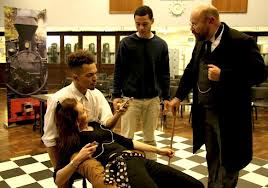 Good morning!
Good morning!Well no one can say the life of a theatre director is boring! I am constantly amazed at where I find myself. And I am always curious and excited about how theatre squeezes itself into nooks and crannies in the most unusual of places. Our work has taken us from performances on busses, in living rooms to Waterloo Station concourse!
 Its also fascinating to meet the people who "get" that bringing a performance into a non-theatre space can vitalise and animate it and transform thinking. It was one such person who invited me yesterday to spend the day at a NHS Clinical Commissioning Group conference half way up the M1.
Its also fascinating to meet the people who "get" that bringing a performance into a non-theatre space can vitalise and animate it and transform thinking. It was one such person who invited me yesterday to spend the day at a NHS Clinical Commissioning Group conference half way up the M1. I had not a clue what a CCG is. I have to admit to a real dislike of acronyms, they seem to me to rip the heart out of language, but I do appreciate that they probably can't be avoided. But I approached my adventure with my usual curiosity. I will be meeting people after all!
I found myself in a group of about 80 medical health professionals mostly GPS but also some consultants and managers. They had come together to talk about their new role as commissioners for health services as the NHS goes through its biggest reform since it began. So what on earth brings me to this drug company in a business park and what part can Theatre possibly play here?
I was invited at this early stage of our potential contract to observe the group working on making sense of how they will commission services. I have heard of course about GP's taking over the reins of health commissioning, but not given it much thought to be honest. It took me a little bit of time to understand exactly what the question is, but its always great to hear specialists discussing their subject and it doesn't take too long to get a sense of what exercises them. It is of course the core of their narrative.
I learnt that commissioning in the NHS means the procuring or buying of services following the disbanding of Primary Care Trusts (PCTs) which have traditionally commissioned services from local hospitals for the local population, whether that be an operation, an outpatient appointment or a trip to the podiatrist.
The NHS reform bill has essentially put these commissioning decisions into the hands of GPs, clinicians who understand what is needed in the best interests of patients. GPs care for families from cradle to grave. They understand their physical, psychological and social needs so are in a uniquely privileged position to see what works and what doesn't work for them. Many GPs have seen systems come and systems go - fundholding, PCGs, PCTs. The NHS bill has now given them the opportunity to be at the very heart of deciding how, when and where their patients receive their treatment and from whom.
PCTs are being replaced by Clinical Commissioning Groups (CCGs).
The main thing one of the GP's said to me is that the culture shift that the bill promotes is about putting patients at the heart of the decisions that doctors make about patient's healthcare..."No Decision About Me Without Me".
The key thrust of the new commissioning is that the CCG's will use what patients tell them to influence commissioning decisions as GPs.
Mmmm it all sounds ok........ but it does raise a little niggling voice for me. I do believe the GPS I spoke to yesterday have the very best of intentions to listen to their patients and make their buying decisions based on these conversations. After all don't they do that every day?
I also know that often in reality 'consultation' is a code word for presenting and getting buy in to an already fully made plan. A way of implementing something without too much opposition. So we will see.
So how do we fit in here? Well we will be commissioned to make a piece of interactive theatre to explore the conversations that GPs will have with their patients to find out what works for them and their needs. We will make a series of narratives with characters, conflicts and perform them to provoke and open up underlying themes and issues.
A key concern is that in consultation groups you tend to get the same people which can skew the information. Its easy then to go with the majority - and miss out on the core and underlying issues for different people and communities. So our job will be to use theatre to raise real emotions and questions and explore them with the audience of doctors. We will turn a meeting room into a theatre, and do what we do, tell a powerful and emotionally engaging story that moves people and gets them thinking.
 |
| Mullered by Clifford Oliver, Carl, Natalie, John and Jordan |

No comments:
Post a Comment